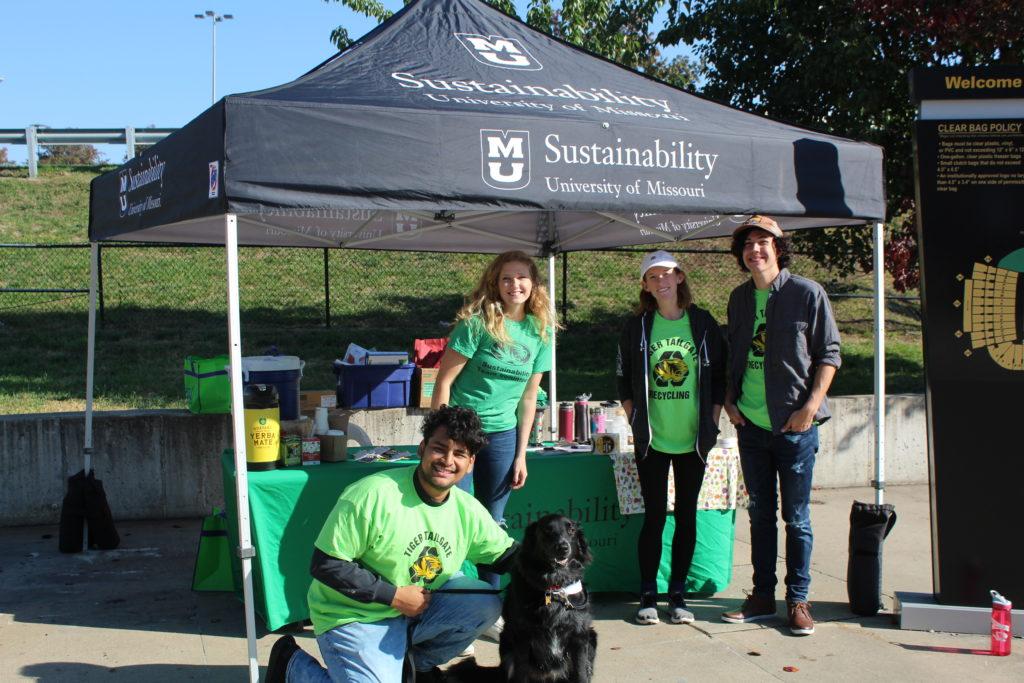
Before the football game, sophomore Scott Heckman finds himself under a canopy tent on the northside of Faurot Field. Surrounded by fellow MU fans, Heckman participates in a different kind of tailgating, one that doesn’t involve alcoholic beverages or games of cornhole.
Since 2005, family members, friends and students like Heckman have participated in Tiger Tailgate Recycling. Through the Sustainability Office, the program aims to encourage tailgaters within a one mile radius of Faurot Field to recycle through passing out recycling bags.
Two or three hours before the game, volunteers walk different routes to target various areas like the Hearnes Center or further areas like Greektown or the MU Health Care buildings, which they drive out on golf carts. In exchange for their help, volunteers are given a complimentary ticket to the game.
“We’ll park the golf cart, walk down the aisles handing out recycling bags and talk to some people for a little bit,” Heckman said. “People are always very nice. If people ask if we have any information, we have flyers that we also hand out about what to recycle, where to leave the bags, that sort of deal.”
At last year’s Homecoming game, the city collected 5.81 tons of recycling from MU, according to a public record from the City of Columbia.
With the upcoming Homecoming game, the program anticipates more recycling bags being handed out. Additionally, more volunteer slots are allocated for the increased number of tailgaters.
“I definitely think people get a little bit more careless [with recycling] when it comes to Homecoming just because it’s a bigger party time,” Zoë Westhoff, student intern in the Sustainability Office, said. “There’s definitely a lot more you have to make up for. But if you anticipate it, it ends up being the same amount as every other game because we can collect it and fix it.”
For larger games like Homecoming and Family Weekend, the program tends to have more volunteers sign up, whereas smaller ones like the Sept. 21 game against South Carolina tend to require less. Recruiting isn’t much of an issue for these larger games, Westhoff said.
“Usually the bigger games kind of recruit themselves,” Westhoff said. “Parents weekend, we actually had to expand the amount of people that we had sign-up and then the same thing for Homecoming.”
Heckman began volunteering with Tiger Tailgate Recycling to fulfill his Business Administration 2500 course requirement of volunteering 15 hours with a nonprofit service organization. The Homecoming game will be Heckman’s fourth time helping out the program. With many alumni coming back, Heckman sees an added pressure volunteering at the upcoming game.
“[There is pressure] especially after the game to have that whole, nice, clean parking lot and not trash everywhere,” Heckman said. “It’s really great to have alumni see clean places around campus to show that we are taking care of where they graduated from and making sure that we keep the place nice.”
While Tiger Tailgate Recycling focuses primarily on game day cleanup, the Sustainability Office works with other organizations like the Homecoming Steering Committee to offer insight on how to clean up other festivities like the Homecoming parade.
“We act as the mentor or the helping hands if somebody needs some guidance,” Ashley Craft, the MU Sustainability programs assistant, said. “We are also working with some individuals from the Mizzou Arts and Sciences Student Council. They’re doing a Homecoming trash cleanup and they requested guidance on how they can best be of service.”
Tailgaters often tell volunteers things like, “we’ve been expecting you,” or offer them food and drinks for their service. Through the program, volunteers begin to develop a sense of community with the tailgaters while at the same time maximizing the amount of materials sent to recycling.
“I feel like programs like TTR can help divert a lot of materials from the landfill, materials that can be recycled,” Craft said. “… At the sustainability office, we look at environmental, social and economic issues as a whole. TTR really helps encompass the environmental issues that we’re faced with and helps us do our part as best as we can.”
_Edited by Laura Evans | [email protected]_